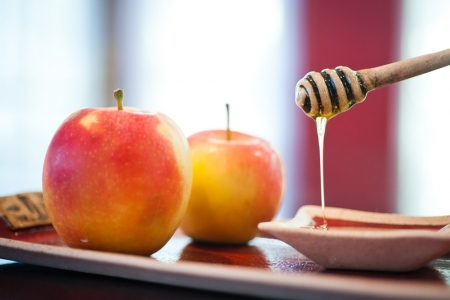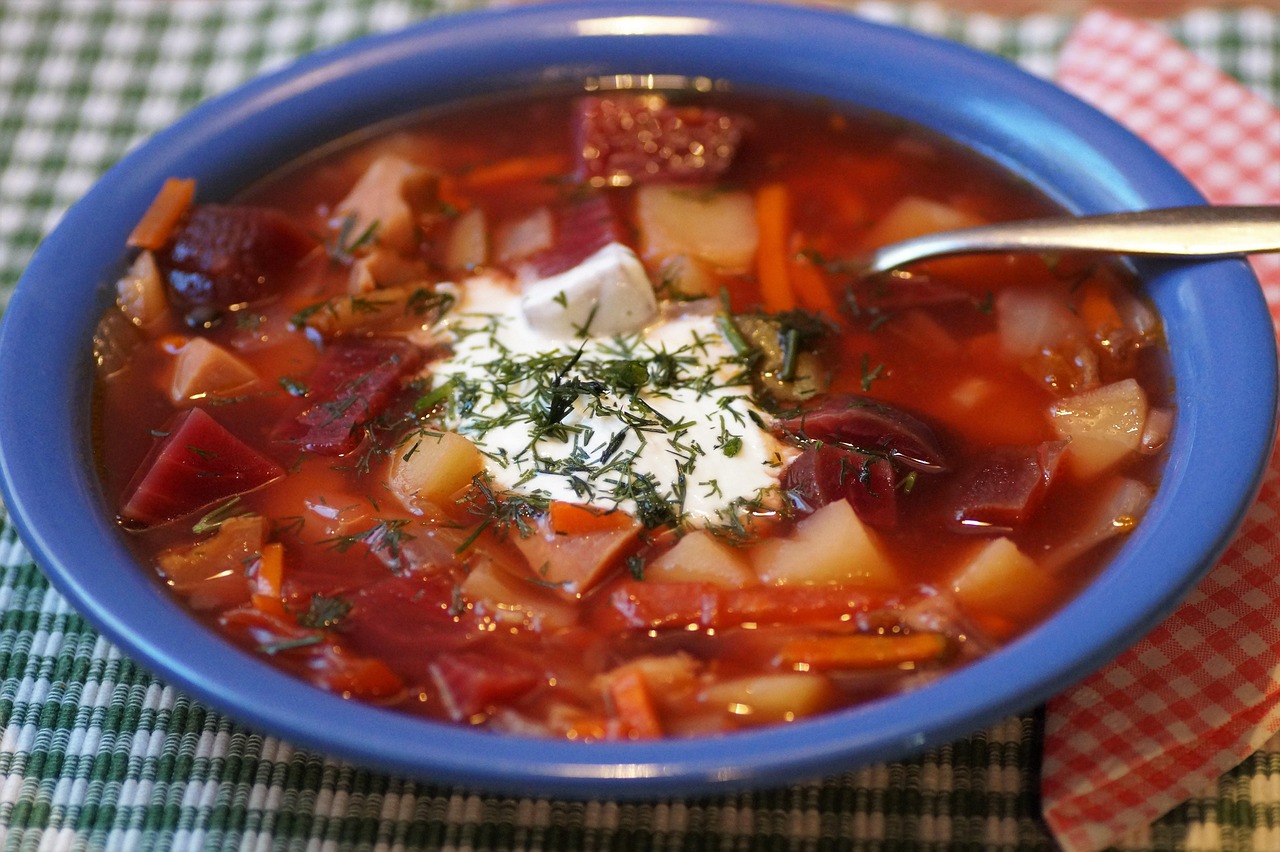Creation
What would you feel if I told you that, in the Jewish tradition, you were being created anew in this very moment?
Rosh Hashanah is the beginning of the year. This is an opportunity to dwell in the space of renewal. The tradition teaches, there is a cosmic re-writing of your story for the coming year in your bones, sinews, muscles, mind, heart, and being.
So, at this meal celebrating Rosh Hashanah, we have the chance to take part in this powerful time, and also bring awareness to the act of creation. Each moment is a microcosm of who we are becoming. We recognize the food we eat as symbols for our prayerful intentions. They are listed here along with exercises. We bless each other and ourselves, celebrating our moments of gratitude. We bring presence and positivity into our hearts, and can get very clear about the truest, most authentic version of ourselves that, we pray, will find expression and aliveness in the coming year. We act as conscious co-creators with The Creator.
A poem from The Radiance Sutras:
The roar of joy that set the worlds into motion
Is reverberating in your body
And the space between all bodies.
Beloved, listen.
Find that exuberant vibration
Rising new in every moment,
Humming in your secret places,
Resounding through the channels of delight.
Know you are flooded by it always.
Float with the sound.
Melt with it into divine silence.
The sacred power of space will carry you
Into the dancing radiant emptiness
That is the source of all.
The ocean of sound is inviting you
Into its spacious embrace,
Calling you home.
Into the Garden: Apples and Honey
The most archetypal foods of this high holiday season are apples and honey.
We look to the roundness of the apple to represent the cycle of the year. We look at the fruitfulness and prosperity the apple represents, and welcome that these blessings be made sweeter by dipping them in honey.
What else does the apple evoke in you? Here is an exercise to help you uncover some associations:
Close your eyes. Take three deep breaths. In through the nose, out through the mouth.
Feel your body and any blocks you have in it. Imagine how you have brought the blocks hiding inside you and feel them like a heavy armor.
Imagine you are walking with this heavy burden along a wall.
Behind it is a garden. You reach the closed gates of the garden and try to look at the garden.
See how you stand still in front of the gate and you undo the armor piece by piece, saying in your mind loudly the name of one of your difficulties and throwing each piece of armor behind you.
Open the gate, if it has not opened by itself.
Enter the garden. When walking in the garden, see yourself at a tree. Bend down to it or stretch up to take an apple from the tree. See your hands and feel your mouth, and holding it in your hands, take a bite of this clear, nourishing, and purifying apple.
Look at yourself. How is your hair? How are you dressed? How do you feel?
As the apple grows and grows, it becomes too big to hold. You place it on the ground and allow it to grow more, larger and larger still. You notice it is now so big that you can walk inside it. What is it made of? What does it look like now? What colors? What shapes? Does it still look like an apple or something else?
Once you are inside your apple, feel honey coming like light into you. Feel it coming down through your whole body, dissolving all toxins, discomfort, and peeling away layers of yourself. Send anything that does not belong out down into the ground. Allow the honey to bring you closer to the apple as you dissolve and breathe with the apple’s core. As you are returning to the Origin, what do you see, feel, sense or know?
Breathe out one time slowly.
Open your eyes.
Share your experience in the present tense.
(Modified from The Encyclopedia of Mental Imagery)
Honey represents sweetness and we wish each other a sweet new year.
Pick up a slice of apple, dip it in honey, and say:
Barukh atah Adonai, Eloheinu melekh ha-olam, borei p’ri ha-eitz.
We praise You, Eternal God, Source of blessing, Creator of the fruit of the tree.
Then add:
Y’hi ratzon milfanekha, Adonai Eloheinu v’Elohei avoteinu v’imoteinu, shetekhadesh aleinu shanah tovah um’tukah.
May it be Your will, Source of All, that this be a good and sweet year for us.
Eat the apple dipped in honey.
Challah
Bread dipped in honey
Barukh Atah Adonai, Eloheinu Melekh haolam, Hamotzi lekhem min ha’aretz.
“Blessed are you, Eternal One, Who brings forth bread from the earth.”
Grape Juice in Gratitude: An Exercise in Mindfulness
“Gratitude is the wine for the soul. Go on. Get drunk.”
—Rumi
Making blessings is about concretizing a moment of gratitude for what we have.
Lift the cup(s) of wine/grape juice and say:
Barukh atah Adonai, Eloheinu melekh ha-olam, borei p’ri hagafen.
We thank You, Eternal God, Sovereign of the Universe, who creates the fruit of the vine.
Before taking a drink,
begin exploring, using as many of your senses as possible.
First, look at the grape juice. Notice its texture. Notice the way it sits and takes the shape of the cup. Notice its color.
Before you drink, explore with your sense of smell. What do you notice?
Take your first sip. Notice the actual sensory experience of tasting. You might want to close your eyes for a moment to focus on the sensations on your tongue, the way it feels in your mouth.
Notice the sensations of swallowing, if the intensity of its flavor changes
being aware of the simple sensations of tasting
Just pay attention, moment by moment. Presence breeds gratitude.
Releasing Thought Patterns: Carrots
Gezer, the Hebrew word for carrot, sounds very much like g’zar, the Hebrew word for decree. Eating carrots on Rosh Hashanah is meant to express our desire that God will tear up any negative decrees against us.
We can put negative decrees on ourselves. They are often unconscious. They come from within in the way we talk to ourselves. They manifest as negative thought patterns like, “I’m not good enough,” “It always ends this way,” “I can’t,” “Why me?” “These people won’t like me.” It’s a tangled energy inside that we want to clear. Identify a negative thought pattern or belief that you carry around.
With this carrot, we ask:
Yehi ratzon milfanekha Adonai Eloheinu she’yeekorah g’zar dee’neinu ve’yeekaroo lefahnekha zekhuyoteinu.
May it be Your will, Source of the Universe, that our harsh decrees are torn up and our merits are proclaimed before You.
As you bite the carrot, imagine this pattern being torn up.
Divine Qualities: Pomegranate
The rimon, or pomegranate, is special for many reasons. If we have not yet eaten it this season, you can make a special blessing celebrating the particular moment of newness. Let this blessing be for the new experiences to come, especially in the way we embrace the aliveness and freshness of each and every moment.
Barukh atah Adonai, Eloheinu Melekh haolam, shehekheyanu, v’kiy’manu, v’higianu laz’man hazeh.
Our praise to You, Source of Blessing, Sovereign of all: for giving us life, sustaining us, and enabling us to reach this season.
There are other links between pomegranates and the Jewish New Year. Some have counted the seeds in a pomegranate and they are said to always come to around 613, which is the number of commandments, or particular physical actions to connect with God. Just as pomegranates are full of seeds, we hope we’ll be similarly full of good actions and positive growth in the coming year.
In Judaism, all the letters in the aleph-bet are assigned numbers. The Hebrew word for honey, D’vash, has the same numerical value as the word Mussar, which speaks to mindfulness. A whole movement of study and practice is called Mussar. It’s about transforming yourself and your qualities, strengthening the virtuous qualities. Like honey, change of self can be a slow process, but it can also be sweet.
Yehi ratzon mil’fa’nekha, Adonai Eloheinu she’nirbeh zekhuyot ke’rimon.
May if be your will, Source of All, that our merits increase like the seeds of a pomegranate.
At your seat, each of you has a card with a quality on it to think about for this meal.
Each card has one quality: joy, action, healing, adventure, love. communication, abundance, acceptance, awakening, beauty, beginnings, believe, breakthrough, commitment, compassion, courage, embracing, emerging, enthusiasm, essence, faith, focus, freedom, fulfillment, grace, gratitude, impeccability, inspiration, leadership, miracles, opening, passion, peace, playfulness, pleasure, power, purification, sanctuary, silence, simplicity, strength, success, surrender, transformation, truth, voyage, wisdom, etc. Think about how the card quality you have fits into your life, what this means to you, and how it makes you feel. How has this quality been demonstrated to you? How have you demonstrated it?
Now consider if this attribute were totally incorporated into your being. How would you be different?
Honoring What’s in Your Life: Raisins
We are going to “raise up” what is important in our lives. Give something a shout out, something you’d like to honor and raise it up into light.
Wishes: Lettuce/Let Us
This is our opportunity to make wishes for our future. “Let Us” on Lettuce. What are you calling into your life? What would you like more of?
Like God said, “Let there be light!” And scripture teaches, “there was light,” we say, “Let us . . .” “Let us have a healthy year!” “Let us have Peace.” “Let us have more life,” etc.
Remove Enemies: A Metta Practice
The Hebrew word for beets is selek. In Aramaic, one of the languages of the Talmud (texts of the oral tradition), silka referred to a leafy green vegetable. This is similar to the word for “remove,” expressing a wish that our enemies will be removed.
The blessing we say is:
Yehi ratzon milfanekha Adonai Eloheinu she’yeekartu soneinu.
May it be your will, Source of Creation, that our enemies or anything blocking us from our truest natures, be removed.
A Buddhist practice to remove obstacles and hatred in your path is called metta. Metta means Loving-kindness in the Pali language. Metta is unconditional, inclusive love. It does not depend on whether one “deserves” it or not; it is not restricted to friends and family. The process is first one of softening and breaking down barriers that we feel inwardly toward ourselves, and then those that we feel toward others.
Take a very comfortable posture. Begin to focus around your chest area, your “heart center.” Breathe in and out from that area, as if you are breathing from the heart center. Anchor your mindfulness only on the sensations at your heart center.
Breathing in and out from the heart center, begin by generating this kind feeling toward yourself. Feel any areas of mental blockage or numbness, self-judgment, self-hatred. Then drop beneath that to the place where we care for ourselves, where we want strength and health and safety for ourselves.
Continuing to breathe in and think these phrases.
May I be safe and protected.
May I be happy.
May I be healthy and strong.
May I be able to live in this world happily, peacefully, joyfully, with ease.
Next, move to a person toward whom it takes no effort to feel respect and reverence, someone who immediately elicits the feeling of care. The first person is usually someone we consider a mentor, a benefactor, an elder. It might be a parent, grandparent, sibling, pet, child, or teacher. Repeat the phrases for this person:
May you be safe and protected.
May you be happy.
May you be healthy and strong.
May you live in this world happily, peacefully, joyfully, with ease.
Now move to a neutral person, someone for whom you feel neither strong like nor dislike. As you repeat the phrases, allow yourself to feel tenderness, loving care for their welfare.
Now move to someone you have difficulty with—hostile feelings, resentments. Repeat the phrases for this person. If you have difficulty doing this, you can say before the phrases, “To the best of my ability I wish that you be….” If you begin to feel ill will toward this person, return to the person it was easy for you to feel this toward and let the lovingkindness arise again. Then return to this person. Let the phrases spread through your whole body, mind, and heart.
After the difficult person, radiate lovingkindness out to all beings. The traditional phrases are these:
May all beings be safe, happy, healthy, live joyously
May all living beings be safe, happy, healthy, live joyously
May all breathing beings be safe, happy, healthy, live joyously
May all individuals be safe, happy, healthy, live joyously
May all beings in existence be safe, happy, healthy, live joyously
—Steven Smith, The Insight Meditation Society
As I read this poem, stay in touch with the ember of warm, tender lovingkindness at the center of your being, and begin to visualize a felt sense of all living beings.
Love all Creation
The whole and every grain of sand in it.
Love every leaf
And every ray of light.
Love the plants.
Love the animals.
Love everything.
If you love everything
You will perceive the Divine Mystery
In all things.
Once you perceive it
You will comprehend it better every day.
And you will come, at last,
To love the whole world
With an all-embracing love.
—Dostoyevsky, Brothers Karamazov
Blessing Each Other: Beans
Rubia, which may refer to several different types of small beans, reminds us of the word yirbu, “to increase,” or rov, which means most or many. These foods symbolize the hope for a fruitful year filled with merit.
The blessing before eating is:
Yehi ratzon milfanekha Adonai Eloheinu She’yirbu ze’khu-yo-taynu.
May it be your will, Eternal God, that our merits increase.
We can begin spreading our blessings right now. Take your attribute card from earlier and turn to someone next to you. As if it is your super power, form a blessing or wish with your card for your neighbor. You do not have to use your card. it is only meant as inspiration.
(Note: At the last seder I ran, everyone decided to go around and make a blessing for the whole room inspired by the theme on their card!)
Debrief: The Meal
Fish heads are usually eaten at a Rosh Hashanah meal. One reason fish is eaten is because it is an ancient symbol of fertility and abundance. This is a blessing for creativity in the coming year, for the easy birth of new ideas, projects, and aspects of yourself. I hope we can live in the awareness of the power and potential to create as we explored at this Rosh Hashanah seder.
The yehi ratzon blessing for fish is:
Yehi ratzon milfanekha Adonai Eloheinu she’nifre ve’nirbe ke’dagim.
May it be your will, Creator of the world, that we be fruitful and multiply like fish.
May everyone have a healthy and happy new year!
What was something interesting that you learned?
What surprised you?
What do you think you are going to remember?












